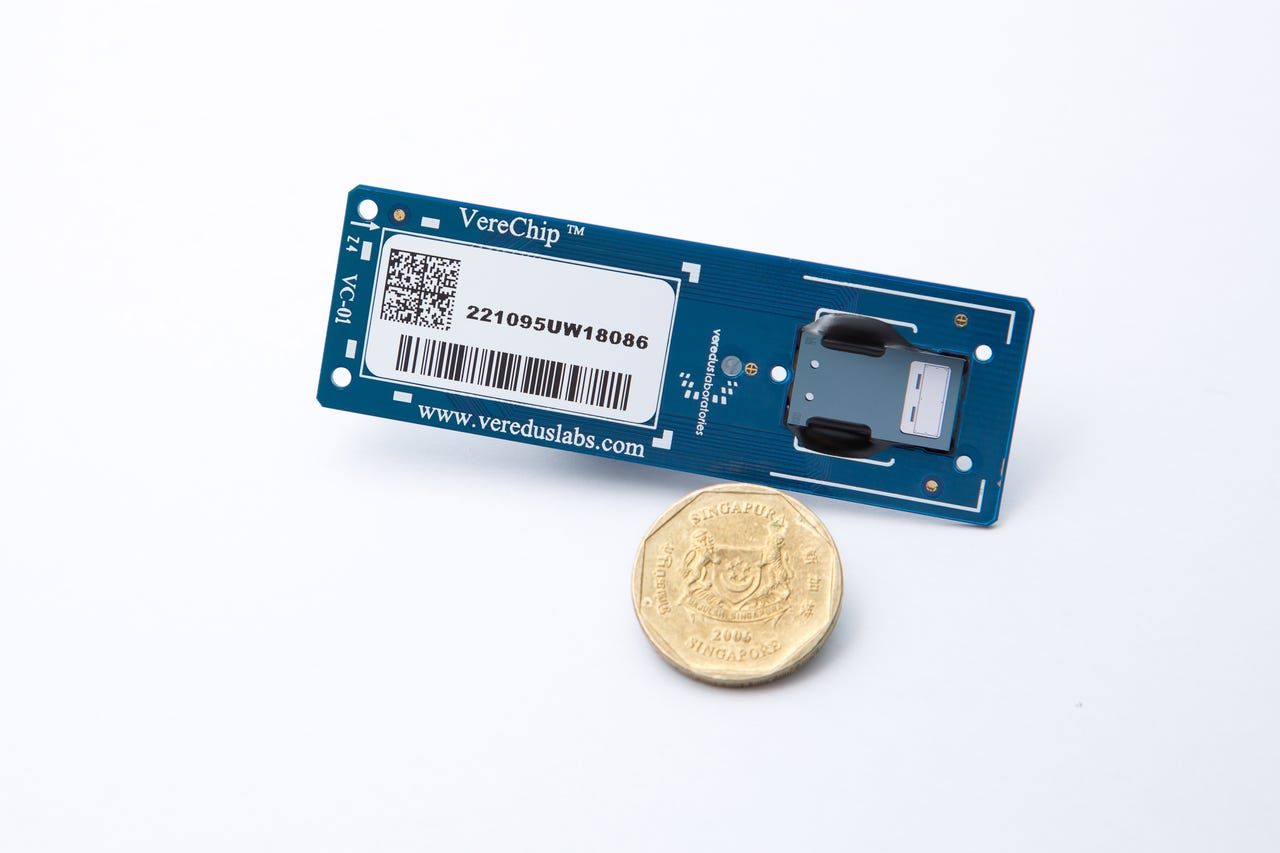STMicroelectronics unveils more accurate TB diagnostics kit

SINGAPORE--STMicroelectronics, together with its locally-based biomedical subsidiary Veredus Laboratories, launched on Wednesday a diagnostic chip to quickly and accurately detect tuberculosis and its variants which show resistance to existing medication.
According to STMicroelectronics, its VereMTB chip is based on the company's Lab-on-Chip technology. It is embedded in a disposable cartridge and combines micro-electro-mechanical system (MEMS) with microfluidics to create a bank of micro-reactor chambers which help analyze human DNA.
Dr. Rosemary Tan, CEO of Veredus Laboratories, said during a media briefing here Wednesday that to carry out a diagnosis, medical professionals should fill the channels of the chip with the patient's DNA--either taken directly from the person's sputum or cultured samples.
The VereMTB chip then diagnoses the sample for Mycobacterium Tuberculosis Complex (TB) and its drug-resistant variants, as well as nine other non-TB mycobacterium infections which are commonly misdiagnosed as TB due to similar symptoms in less than three hours, Tan added.

Chip improves accuracy, speed of diagnosis
Thomas Dick, head of the antibacterial drug discovery laboratory in the department of microbiology at National University of Singapore's School of Medicine, identified TB as the second-deadliest infectious disease worldwide.
In order to fight the disease, medical professionals will need to accurately diagnose patients and administer the right drugs, failing which the treatment could lead to strengthening the bacteria and making it more resistant to existing drugs, Dick added during the briefing Wednesday.
However, existing methods of diagnosing tuberculosis are still underdeveloped in many countries and these are both inaccurate and taking too long to complete. Pharmaceutical companies are not helping the situation by developing drugs that are ineffective in fighting the disease, he added.
For example, Dr. Tan noted smear microscopy of a patient's sputum takes an hour to generate results but it is too insensitive to detect TB. On the other end of the scale, culturing bacteria on a container with nutrients is highly sensitive but takes 4 to 6 weeks for results to show.
This is why the VereMTB Lab-on-Chip capabilities brings the dual advantages of accuracy and speed, STMicroelectronics noted.
Dr. Tan added Uganda is currently using the diagnostic kit, which will come in handy in a country where many of its citizens are affected by tuberculosis. The Chinese Center for Disease Control and Prevention in Beijing is also undergoing clinical trials with the product, she said.
In Singapore, the VereMTB chip is used for research purposes. Veredus Laboratories is in discussions with hospitals for them to use it as a regulated product for diagnosis, she added, but declined to comment on how much the chip may cost when it goes to market.
Opportunities for microelectronics in Asia
Francois Guibert, president of Greater China and South Asia at STMicroelectronics, also identified the strong potential of microelectronics for Asia's healthcare industry.
Speaking to ZDNet Asia at the event sidelines, Guibert said the tropical climate in Southeast Asia results in many influenza- and bacteria-related diseases to flourish. Additionally, several countries here, especially China, are experiencing an ageing population and inadequate diagnostic controls, he noted.
Citing the 2012 World Health Organization's (WHO) report on TB, he pointed out India and China as having almost 40 percent of the world's TB cases, while more than 60 percent of multi-drug-resistant cases in 2011 were from India, China and Russia.
Such conditions bring opportunities for the blending of microelectronics and healthcare to produce better technology to diagnose patients and treat them, the executive explained.
However, unlike the IT industry where chips are commonly used in hardware, the healthcare industry is "skeptical" about the potential of microelectronic chips for medical advances, Guibert observed. This is because medical technologies have traditionally revolved around machines, rather than chips, so healthcare professionals are hesitant about the move, he explained.
As such, there should be more effort put in to educate medical professionals on the benefits and improvements to current technology that such innovations can bring to the wider healthcare community, Guibert urged.